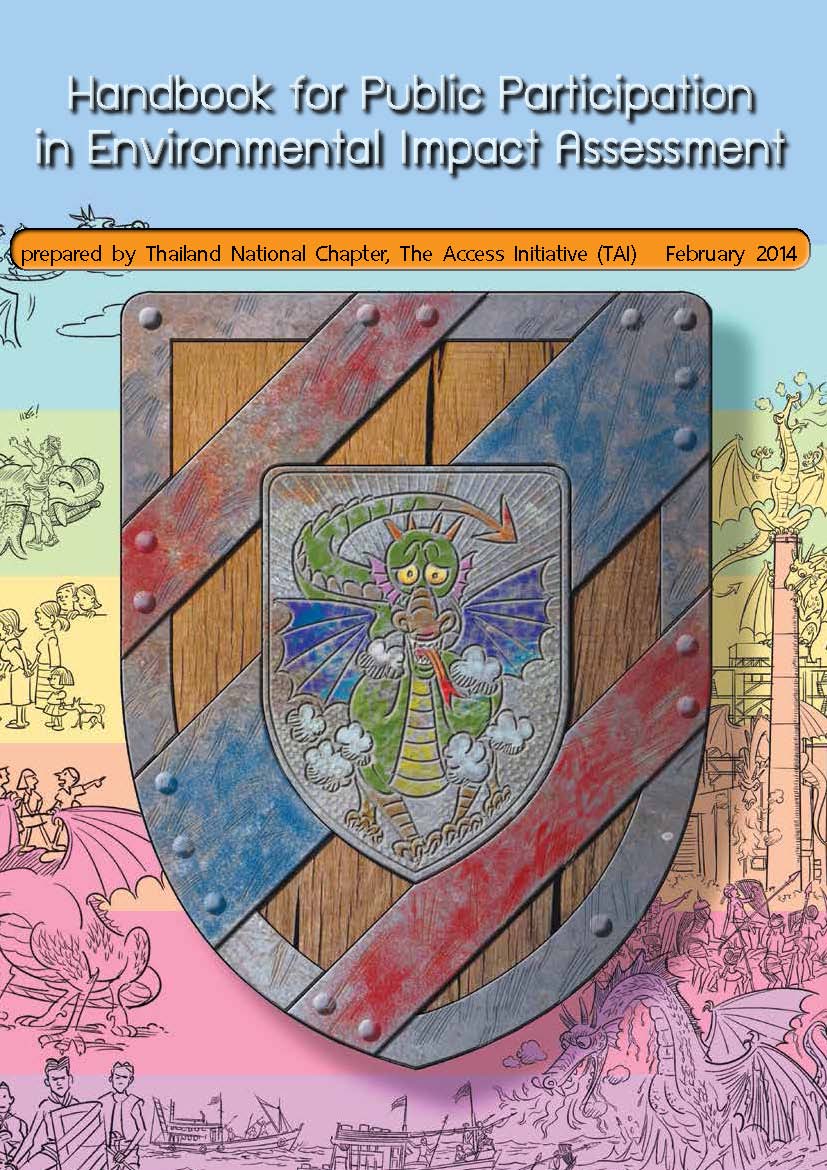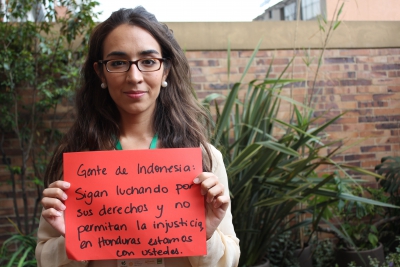This illustrated handbook for community and civil society organisations gives clear guidance on public engagement in environmental impact assessments.


This illustrated handbook for community and civil society organisations gives clear guidance on public engagement in environmental impact assessments.
Published: 2014
At the foot of the dark green mountains that surround Bogotá, Colombia, over 90 energetic access rights and forestry advocates spent three days learning from each other during the 2014 TAI Global Gathering. The Gathering created a space where new ideas mingled freely with established approaches, and veteran TAI members, new members and forest governance experts could build meaningful relationships. Held from October 29-31, 2014, the 2014 Global Gathering was the largest in TAI’s 13 year history and included participants from 42 countries. The event was sponsored by four WRI programs – The Access Initiative, Global Forest Watch, the Governance of Forests Initiative and the Land and Resource Rights Program – as well as the Open Society Foundation. Hosted by Colombian TAI member organization Asociación Ambiente y Sociedad, the conference was centered around the theme of “Using Information, Data and Technology to Protect Forests and Strengthen the Rights of Forest-Dependent Communities”. The innovative facilitation style of the Gathering capitalized on the strengths of this unique combination of participants was accompanied by an innovative facilitation strategy. Allen Gunn of Aspiration guided the participants through interactive sessions, which encouraged meaningful discussion and collaboration focused on concrete outcomes. The event agenda was shaped by participants on the first day of the event, and reflected common areas of interest and desired outcomes from the Gathering. The agenda retained significant flexibility to allow for new sessions to teach participants the specific skills they identified as most important to their work. The constant teaching/learning that defined the Gathering involved a skill share, dozens of interactive sessions and a ‘science fair’ where participants demonstrated their tools for effective monitoring and advocacy for access rights. The following tools were presented at the science fair: 1. Sarawak GeoPortal – Bruno Manser Fonds (Simon Kalin) 2. Open Development Cambodia – Open Development Cambodia (Terry Parnell) 3. Sapelli Mobile Tool – ExCites UCL (Gillian Conquest) 4. Pollution and Illegal Logging Maps – Digital Democracy (Gregor Maclennan) 5. GFW Commodities – Global Forest Watch (Benjamin Jones) 6. GFW Fires – Global Forest Watch (Rachael Petersen) 7.Development Alert! – Jamaica Environment Trust and The Access Initiative (Danielle Andrade, Carole Excell) 8. Environmental Democracy Index – The Access Initiative (Jesse Worker) 9. Indaba – Global Integrity (Monika Shepard) 10. Release and Transfer Registers – Environment People Law (Viktor Yurochko) 11. EIA Resource and Response Center – LIFE (Ritwick Dutta) 12.STRIPE – The Access Initiative (Elizabeth Moses) While the sessions were open to any and all who wanted to attend, the regional sessions on the last day created a space for a more structured conversation about specific network priorities. Led by the TAI Core Team members, these sessions divided participants by geographic region and produced a short list of regional priorities that will define the TAI network in the coming year(s). The regional sessions were followed by a Core Team Accountability Session, in which TAI members could ask questions and share opinions about the past and future network policies and activities. While building and cementing relationships formed the core of the Gathering, the thematic focus highlighted valuable approaches to work on access rights. The Global Gathering offered an opportunity to test the proposition that technology can revolutionize natural resource protection. Many of the sessions provoked discussions about innovative data and technology use, but also reminded participants that access to these new tools isn’t enough. Communities of practice like TAI are essential to supporting the effort to ensure that technologies with great potential are implemented well and have a positive impact. To build on the momentum and excitement created in Bogotá, the TAI Secretariat collected the principal ideas and outcomes into the 2014 Global Gathering Outcome Report. Please read through it to find more about what was discussed at the Gathering and the network’s plans for the future!

By Daniel Barragan (Posted: November 19, 2014)
El inicio de esta negociación es una buena noticia para la región ya que significa que en el mediano plazo los países de América Latina y el Caribe (ALC) contarán con un instrumento para garantizar un ejercicio efectivo de los derechos de acceso y para una mejor canalización y resolución de los crecientes conflictos socio-ambientales, con el consiguiente mejoramiento de la gobernabilidad democrática.
Con el compromiso asumido el pasado 6 de noviembre en Santiago de Chile por parte de los Gobiernos de Latinoamérica y el Caribe, y que da vida a un comité de negociación de un instrumento jurídico internacional, la ciudadanía de la región está cada vez más cerca de contar con una herramienta de carácter internacional que garantice la aplicación efectiva de los derechos de acceso a la información, participación y justicia en asuntos ambientales. Los llamados derechos de acceso, esenciales para la protección de nuestros recursos naturales, la garantía de los derechos de las comunidades y el desarrollo sostenible de nuestros países.
Representantes de 19 países de América Latina y el Caribe firmantes de la Declaración del Principio 10 -que promueve los derechos de acceso a la información, participación y justicia en asuntos ambientales-, junto con representantes de los países observadores y actores de la sociedad civil, se congregaron en la Cuarta Reunión de los Puntos Focales designados por los gobiernos de los países signatarios de la Declaración sobre la aplicación del Principio 10 de la Declaración de Río sobre el Medio Ambiente y el Desarrollo en América Latina y el Caribe realizada del 4 al 6 de noviembre en la sede de la CEPAL en Santiago, Chile. Como resultado de esta reunión se aprobó la Decisión de Santiago, en la cual se incluyeron puntos fundamentales para la continuación de la negociación regional, entre ellos la adopción de los contenidos de San José (provenientes de la anterior reunión de grupos de Trabajo en Costa Rica), como índice de temas para la negociación del instrumento, la creación de un comité de negociación en el que se reafirma la importancia de la participación del público, y la inclusión de nuevos países en la Mesa Directiva encargada de dirigir el proceso.

Article by Alisa Zomer, Yale F&ES ’14 (Posted: November 10, 2014)
The murals and graffiti that define public space in Bogota give an impression of the country’s creativity, diversity, and struggle. Emerging from a period of political and social unrest, Colombia is enjoying a period of economic growth and positive international attention. As an example of what is possible, Colombia is the perfect place for civil society to gather from around the world to learn from one another, share strategies, and get energized to move on important environmental rights. This year’s gathering, hosted by Colombian Asociacion ambiente y sociedad, had 95 representatives from over 40 countries. It focused on the intersection between technology and forest management. A defining moment of diversity and group-think was during the exercise “Agree, Disagree, Unsure.” Participants came up with controversial statements (i.e. ‘using technology is necessary for environmental protection,’ ‘democracy does not work for the environment,’ ‘business must be part of the solution,’ ‘there is no sustainable mining,’) and were asked to take a position and discuss. It was valuable to see the wide range of positions on seemingly simple issues and especially interesting experiencing participants persuade others to join their side – all with appreciation and respect.
View the full story here: http://epi.yale.edu/the-metric/photo-essay-global-gathering-environmental-rights
Published: 2013
TAI Training Powerpoint
Published: 2013
TAI Training Powerpoints
Published: 2013
TAI Training Powerpoints
Published: 2013
TAI Training Powerpoints
Published: 2013
TAI Training Powerpoints
Published: 2013
TAI Training Powerpoints